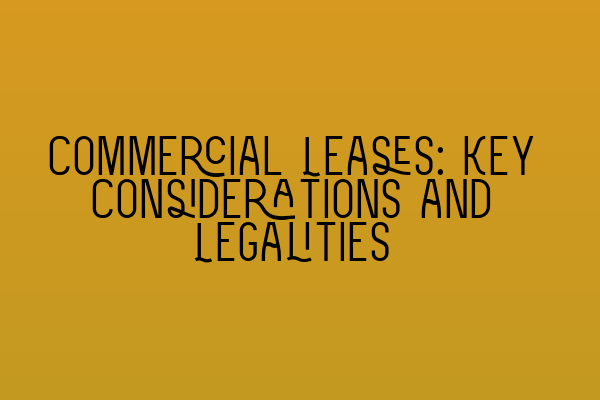Commercial Leases: Key Considerations and Legalities
When it comes to commercial leasing, there are certain key considerations and legalities that both landlords and tenants need to be familiar with. Commercial leases are complex legal documents that govern the rights and obligations of both parties involved in the lease agreement.
Whether you’re a landlord looking to lease out a commercial property or a business owner searching for the ideal space to operate your business, understanding the key considerations and legalities of commercial leases is crucial. In this article, we’ll explore some important factors that you should keep in mind.
1. Lease Term
The lease term refers to the duration of the lease agreement. Commercial leases typically have longer terms compared to residential leases, often ranging from three to ten years or more. It’s important for both landlords and tenants to carefully consider the lease term and negotiate a mutually beneficial length that aligns with their business goals.
If you’re a tenant, you’ll want to ensure that the lease term provides you with enough stability to grow your business without the risk of being forced to relocate prematurely. On the other hand, landlords may prefer longer lease terms to guarantee a steady income stream.
2. Rent and Rent Review
The rent is a fundamental aspect of any commercial lease agreement. Landlords should carefully determine the appropriate rental amount based on factors such as the property’s location, size, market demand, and any additional services or utilities included.
Rent reviews are typically included in commercial leases to account for inflation and market changes. These reviews allow for periodic adjustments in the rental amount, ensuring fair compensation for both parties. It’s crucial to clearly define the rent review mechanism in the lease agreement to avoid any future disputes.
3. Repair and Maintenance Responsibilities
Commercial leases specify the respective responsibilities of landlords and tenants when it comes to repair and maintenance. Generally, landlords are responsible for structural repairs and maintenance of the exterior, while tenants are responsible for maintaining the interior and fixtures within their rented space.
It’s essential for both parties to clearly understand their obligations and ensure that the lease agreement reflects these responsibilities accurately. This way, any potential disputes concerning repair and maintenance can be avoided or resolved more smoothly.
4. Break Clauses and Renewal Options
Break clauses and renewal options provide flexibility to both landlords and tenants. A break clause allows either party to terminate the lease before its expiration date, subject to certain conditions specified in the agreement. On the other hand, renewal options allow tenants to extend the lease for an additional period.
These clauses can be advantageous for tenants who may need to downsize, relocate, or close their business before the lease term ends. For landlords, break clauses and renewal options can provide opportunities to renegotiate the lease terms or find new tenants if required. Properly drafting these clauses in the lease agreement is crucial to ensure clarity and prevent future disputes.
5. Use and Alterations
Commercial leases specify the permitted use of the leased premises, outlining the activities that tenants can undertake within the space. It’s essential for tenants to ensure that the permitted use aligns with their business needs and future growth plans.
Additionally, if tenants wish to make alterations or modifications to the leased premises, they must seek the landlord’s consent. The lease agreement should clearly outline the procedure for obtaining permission for alterations, ensuring that compliance with any legal or planning obligations is met.
Conclusion
Commercial leases encompass various legal considerations that both landlords and tenants need to navigate. Understanding the key aspects discussed in this article will ensure that you are well-informed and in a better position to negotiate and enter into a successful commercial lease agreement.
At SQE Property Law & Land Law, we have a team of experienced solicitors who specialize in commercial leases. Our experts can guide you through the legalities, assist with lease negotiations, and ensure that your rights and interests are protected. Contact us today for more information.
Related Articles:
